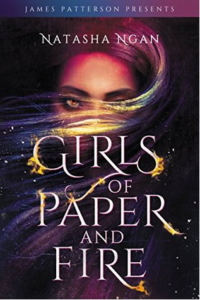I unreservedly loved the first half of this book. I’ve had a problem recently with books claiming to represent the various of my identities and doing a pretty shitty job of it, so it was something of a relief to see how meticulous Natasha Ngan and the team behind Girls Of Paper And Fire were about promoting this novel as being based on her Malaysian-Chinese heritage through her mom. I was further delighted by the world-building, with its lovely references to recognizably Malaysian touchstones amidst the fantasy trappings. Ms Ngan does a beautiful job of representing our shared heritage and I am forever grateful to her for doing this.
 The story itself follows Lei, the 17 year-old daughter of herbalists who is cruelly taken from her home by an ambitious general to be presented as a gift to the Demon King. There are three castes in the world of Ikhara: the fully human Paper, the mostly human but with demon/animal features Steel, and the mostly demon but still recognizably humanoid Moon. The Moon caste have been in power since the Night Wars that rent the kingdom, and the Demon King rules over all. Every year, eight women of the Paper caste are selected as his concubines. Lei is cast in with them.
The story itself follows Lei, the 17 year-old daughter of herbalists who is cruelly taken from her home by an ambitious general to be presented as a gift to the Demon King. There are three castes in the world of Ikhara: the fully human Paper, the mostly human but with demon/animal features Steel, and the mostly demon but still recognizably humanoid Moon. The Moon caste have been in power since the Night Wars that rent the kingdom, and the Demon King rules over all. Every year, eight women of the Paper caste are selected as his concubines. Lei is cast in with them.
Some of her fellow concubines are kind to her but some are awful, and then there’s Wren. As she and Lei fall in love, they must hide their relationship from a court where they are seen only as belongings of the King, making each shared kiss an act of treason. But Wren is hiding other secrets as well, secrets that could set their entire world on fire.
Brilliant premise, and really great first half execution. But then Lei goes from being spunky and relatable to hysterically demanding to know all Wren’s secrets, accusing her of lack of trust, and I just had horrible flashbacks to every crappy show and movie I’ve ever seen where this dumb “if you don’t tell me all your secrets, you don’t really love me” shit is thrown in to add drama to the proceedings. Every time Wren caved in to the emotional manipulation, I liked Lei (and respected Wren) a whole lot less. And Lei’s disgust when Wren kills someone who was trying to kill them first felt so wholly manufactured for the dramz that I could hardly even take her seriously from then on. It also felt like the careful control Ms Ngan had over her narrative began to fall apart, as plot points felt more hastily spliced in during the second half of the book, culminating in scenes and revelations that actually had me rolling my eyes. I think the worst was when her pendant finally opened. Given Wren’s stirring speech earlier about Lei’s drive to fight for what was right, Lei’s interpretation of what she found in the pendant felt almost like an insult, both to Wren’s belief in her and to the readers’ intelligence.
There’s so much great representation here in terms of culture and sexuality that it’s such a disappointment when the characterization and plot just go askew like that. I’m not entirely closed to the idea of reading the sequel, but even from the preview included in my Kindle copy, I’m disappointed by Lei’s continuing dumbassery. This is one of those series where I Want To Believe it’ll get better, and am hoping to be persuaded by others who have read further books.
